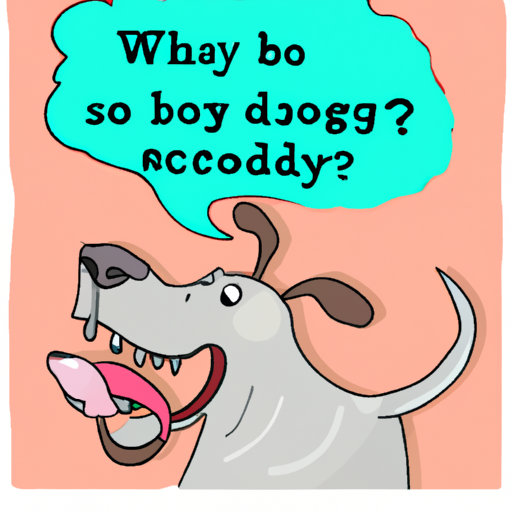We all know the feeling. You’re sitting on the couch, your beloved pooch jumps up next to you, and suddenly there’s a puddle of drool on your lap. But have you ever wondered why dogs slobber so much? Let’s delve into the world of canine slobber, why it happens, and what it means for your furry friend’s health.
H2: The Science Behind Slobber
Drooling, or slobbering, is a natural part of a dog’s digestive process. Saliva plays a crucial role in helping dogs digest their food, as it contains enzymes that start breaking down food even before it reaches the stomach.
- Salivary Glands: Dogs have four sets of salivary glands that produce saliva. The saliva is then transported through ducts into the mouth.
- Digestive Enzymes: Saliva contains enzymes that begin the digestion process by breaking down food particles. This helps ease the work of the stomach and intestines.
- Lubrication: Saliva also lubricates the food, making it easier for dogs to swallow their meals.
Here’s a quick overview of the process in a table:
| Steps | Description |
|---|---|
| 1 | Salivary glands produce saliva |
| 2 | Enzymes in saliva begin digestion |
| 3 | Saliva lubricates food for easy swallowing |
H2: Why Some Dogs Slobber More Than Others
Not all dogs are created equal when it comes to slobber. Some breeds are more prone to drooling than others. This is often because of the shape and size of the dog’s lips and jowls. Breeds such as Bulldogs, Mastiffs, and Saint Bernards have loose, floppy lips that allow more saliva to collect and drip out.
However, if your dog isn’t one of these breeds and suddenly starts drooling more than usual, it could be a sign of a health problem.
H2: Health Issues That Cause Excessive Drooling
Excessive drooling can sometimes be a symptom of an underlying health issue. These can range from dental problems to heatstroke, or even poisoning.
- Dental Problems: Dental disease, mouth injuries, or the presence of a foreign object can lead to increased drooling.
- Heatstroke: Dogs can’t sweat like humans do. Instead, they pant and drool to cool down, which can be a sign of heatstroke if excessive.
- Poisoning: Certain toxic substances can cause excessive drooling. If you suspect your dog has ingested something harmful, seek immediate veterinary care.
H2: Managing Your Dog’s Drooling
As a caregiver, knowing how to manage your dog’s drooling can help keep both you and your furry friend more comfortable.
- Regular Dental Check-ups: Regular dental check-ups can help catch potential problems early, reducing the risk of excessive drooling due to dental issues.
- Hydration: Keeping your dog hydrated, especially on hot days, can help prevent heatstroke and excessive drooling.
- Safe Environment: Keep toxic substances out of your dog’s reach to prevent accidental ingestion.
H2: Frequently Asked Questions (FAQs)
Why is my dog suddenly drooling excessively?
Sudden excessive drooling could indicate a health issue. It’s best to consult your vet if this happens.
Are certain dog breeds more prone to drooling?
Yes, breeds with larger, looser lips and jowls, like Bulldogs and Mastiffs, tend to drool more.
Can I do anything to reduce my dog’s drooling?
Regular dental check-ups, keeping your dog hydrated, and ensuring a safe environment can help manage your dog’s drooling.
Remember, slobber is a normal part of a dog’s life. While it can be a bit messy, it’s just one more thing that makes our canine companions so endearing.



